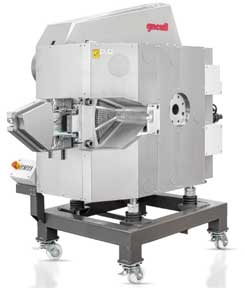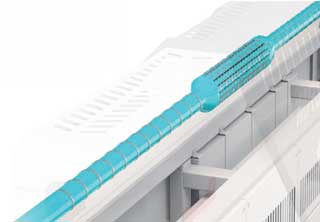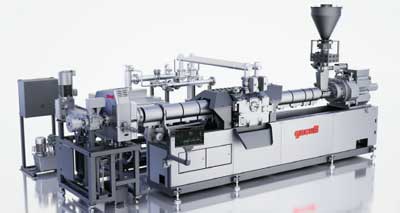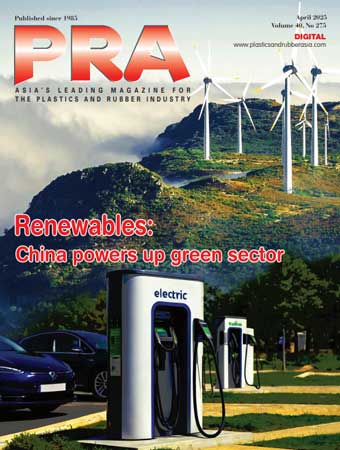Machinery at K2025
Revolutionising extrusion efficiency with Gneuss
In an era of global uncertainty, extrusion processors face mounting pressure to reduce costs while maintaining quality and output. Machinery maker Gneuss offers advanced melt filtration and extrusion equipment that can be integrated into existing lines to achieve efficiency improvements for cost savings and competitiveness.

Gneuss´ flagship model, RSFgenius, ensures steady melt pressure even when processing recycled material, thanks to its highly-efficient, automatic, integrated self-cleaning system, catering to a wide range of demanding applications. The filter elements can be automatically cleaned in situ up to 400 times and filter elements as fine as 10 micron (1.200 mesh) can be applied.
At Hall 9, Stand A2, Gneuss will display the RSFgenius 330L, one of the best-selling (and one of the largest) models, with an active filtration area of 2.150 sq cm and filtration fineness of 75 microns for LDPE/LLDPE film recycling.
Retrofitting a fully-automatic RSFgenius to an existing extrusion line, whether in a pelletising, sheet, fibre or pipe application, permits the use of more contaminated material and/or the use of finer screens without disrupting the process or reducing production yield. Every retrofit is tailor-made and usually without the need to move any existing equipment.
Three further Gneuss screen changer ranges will be presented: SFXmagnus, SFneos and KSF screen changers. The SFXmagnus is a process-constant screen changer for a wide range of applications; SFneos is a specialised screen changer that offers a high level of process and pressurestability, equivalent to that offered by the RSFgenius.
Lastly, the KSF range of screen changers is processconstant and designed with sensitive polymers in mind. It is mostly used in compounding where its customisable design for fast material and grade changes is a major advantage.
All three Gneuss screen changers are able to operate pressure and time-controlled and process-constant, with screen changes done without disturbing the process.
Multiple screw extruder for rPET processing

The MRS extruder is based on conventional single screw technology but is equipped with a multiple screw section for devolatilisation, allowing for efficient and gentle decontamination of the polymer melt.
The MRS extruder permits the processing of r-PET directly into high quality end products such as packaging sheet, strapping tape or filaments without pre-drying by using a simple and rugged vacuum system. All this is achieved by means of its patented processing section, which is a drum containing multiple satellite single screws, driven by a ring gear and pinion transmission.
The satellite screws rotate in the opposite direction to the main screw. This disproportionately increases the surface exchange of the polymer melt. A large opening for venting, exposing the full length of the satellite screws, is under vacuum. This provides unrestricted access to the polymer melt, the surface of which is constantly replaced at a very high rate by the counter-rotation of the satellite screws in the multiple screw section.
The surface area and the surface area exchange rate available for devolatilisation are far greater than in other extrusion systems. As the thermal and mechanical stress on the polymer melt is minimised, reclaim has excellent optical and mechanical properties, while in a simple extrusion step, harmful contaminants are thoroughly removed, assuring that the end product is safe for use in food contact applications.
Omni recycling machines for PET recycling

Gneuss’s MRS extrusion technology is known as an alternative for the reprocessing of contaminated materials like PET, PS, PP or PE. In combination with Gneuss’s rotary filtration systems, optimised vacuum technology, an online viscometer VIS and Gneuss measurement technology, customisable recycling lines tailor-made for a specific material can be engineered. As an option, light-weight or fluffy materials can be fed into the extruder via a 3C Rotary Feeder.
Omni recycling lines offer Several Letters of Non-Objection (LNOs) from a North American food safety authority, EFSA conformity and local approvals in Latin America confirm the decontamination efficiency of the technology.
As volatile contamination is removed efficiently in the MRS extruder under vacuum and solid contamination is removed by fine filtration in the rotary filtration system, Omni offers high quality and food compliant recycling in one simple, compact and sustainable extrusion step.
Typical applications for Omni machines include the processing of PET reclaim, such as bottle, sheet regrind or fibre waste, into high quality end products, such as thermoformed sheet (suitable for food contact), staple fibre, POY, FDY, BCF or strapping tapes.
In addition, a wide range of materials such as PS, PP, PE, or PLA can be recycled. The Omni series can also be used in the decontamination of post-consumer waste to produce direct food contact products such as HDPE bottle caps or milk bottles, coffee caps and for odour reduction and degassing of PA, SAN or other polymers.
Omni machine for post-consumer PET reclaim
At the K show, Gneuss will present the core of an Omni recycling machine: a MRS 110 extruder.
After the show, the complete line, including a water ring vacuum system and the fully automatic RSFgenius 90 melt filtration system, will be delivered to Cotnyl, an Argentinian manufacturer specialising in thermoformed plastic packaging.
Designed to process 600 kg/hour of undried and uncrystallised PET or 400 kg/hour of PP, the system will produce high-quality thermoforming sheet for food packaging applications. The technology has already been approved for food contact by Argentina’s food safety authority Senasa.
In addition to its compact design, as it requires little space and can be easily integrated into existing premises, Omni scores highly in terms of flexibility.
(PRA)SUBSCRIBE to Get the Latest Updates from PRA Click Here»










